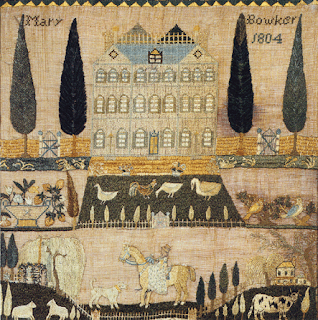To the Board of the Burlington County Historical Society:
I am writing to express my dismay at the theft of the 1804 Mary Bowker sampler. I am also writing concerning the Board’s decision to auction 29 samplers from the Society’s collection.
I have several questions.
1) How does this sale reinforce the BCHS’s stated mission (found on your website on November 17, 2010) “to encourage historical study and research; to acquire and preserve records, artifacts, and articles of historical interest; and to interpret the history of the area through education, programs, projects and pursuits in order to convey this historical legacy to current and future generations?”
Samplers are unique artifacts of material culture, for they contain within them the story of an individual girl, her school, her family, and her community.
2) How does this sale reinforce the BCHS’s recently adopted mission statement (found in the auction catalog on November 17, 2010) “to tell the rich history of the County to children and their families through new interactive exhibits?”
Samplers were usually made by children. Many of your samplers were made by children from Burlington County. I see from photos of your gallery space that these samplers are currently on exhibit. Would it not be possible to interpret samplers in a way that makes the rich history of Burlington County interactive? Children are fascinated by the toys, clothing, books, and yes, samplers, of their predecessors.
3) Is the Board aware that the intended use of the funds raised by the sale of the samplers is not in compliance with the American Association of Museum’s Code of Ethics? According to the auction catalog, “the sale proceeds of the needlework and furniture from the Society’s collection will be used to develop…participatory exhibitions and interpret the significant roles of transportation, agriculture, the military and the Underground Railroad.”
The American Association of Museum’s Code of Ethics states: "Proceeds from the sale of nonliving collections are to be used consistent with the established standards of the museum's discipline, but in no event shall they be used for anything other than acquisition or direct care of collections." Exhibit planning and interpretation is not included in this category.
4) Is the Board aware that sampler and needlework research is a field that has attracted serious scholarship?
Recent studies of Virginia, Ohio, Maryland, the Carolinas, and Connecticut have all shown that samplers and needlework are unique among artifacts. A careful examination of samplers can reveal the not only the stitchers’ skills and personal preferences, but also their social status, geographic origins, financial straits, and family connections. Because samplers were a domestic and educational art, practiced by young girls, they are sometimes the only record we have of that stitcher’s life. They fill in the gaps in the written record. Women were not individually named in the US census until 1850, yet they left their signatures on countless pieces of linen. In my own work, documenting 19th Century Tennessee samplers, I have been known to travel across the state to examine one sampler. To find 29 samplers in one collection is a researcher’s dream.
5) How will the deaccessioning and sale of these artifacts affect the BCHS’s relationship with past donors? Are you sure the museum has legal title to the samplers? You must have a signed Deed of Gift or a sales receipt to prove ownership, otherwise it is illegal for you to sell them and you may run a risk of lawsuits.
I see from the auction catalog that acquisition of the samplers began in 1957, with gifts from an estate. Until 1998, the BCHS acquired samplers through a combination of donations and purchases. Have the donors who gifted the samplers been informed of the Society’s plans to deaccession them? Will potential donors be reluctant to entrust the Society with their family heirlooms? It took forty years to build the Society’s sampler collection, which will be dispersed in the space on one afternoon.
I sincerely hope that the 1804 Mary Bowker sampler is recovered. I suggest that the BCHS reconsiders the sale of these samplers and pulls them from the auction block. If the auction proceeds, I hope that new homes for the samplers are found in public institutions, where the residents of New Jersey and visitors to your state can appreciate them.
Jennifer C. CoreTennessee Sampler Survey
jen@tennesseesamplers.com
www.tennesseesamplers.com



